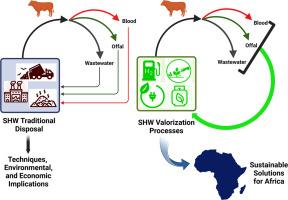A literature review of slaughterhouse waste valorisation: Techniques, environmental, and economic implications
IF 10.9
1区 环境科学与生态学
Q1 ENGINEERING, ENVIRONMENTAL
引用次数: 0
Abstract
Managing slaughterhouse waste (SHW) is a critical global challenge. Over the past two decades, the focus on sustainable waste management has intensified, with valorisation emerging as a key solution. This review examines the most significant outcomes of recent advancements in SHW valorisation, particularly from 2010 onward, with an emphasis on African contexts, which remain underrepresented in the literature. Notable results include the successful integration of biochemical processes, advanced waste-to-energy technologies, and nutrient recovery techniques. These approaches have demonstrated measurable outcomes such as significant reductions in environmental impact, enhanced energy recovery, and economic benefits for local communities. Case studies from African countries showcase the effectiveness of specific valorisation strategies, including high-efficiency biogas production and resource recovery, offering practical insights for wider adoption and scalability. Organized into 11 sections, the review identifies key research gaps, such as the need for region-specific technologies and policy frameworks and proposes concrete recommendations for advancing circular economy practices. The ultimate aim is to provide a roadmap for researchers, policymakers, and industry professionals to drive the sustainable development of SHW management, contributing to global efforts for waste reduction and resource maximization.

屠宰场废物增值的文献综述:技术、环境和经济影响
管理屠宰场废物是一项重大的全球性挑战。在过去的二十年中,对可持续废物管理的关注已经加强,价值增值成为一个关键的解决方案。本综述考察了SHW估值近期进展的最重要成果,特别是自2010年以来,重点关注了文献中代表性不足的非洲背景。值得注意的成果包括成功整合生化过程、先进的废物转化为能源技术和营养回收技术。这些方法已经证明了可衡量的结果,如显著减少环境影响,提高能源回收率,并为当地社区带来经济效益。来自非洲国家的案例研究展示了具体增值战略的有效性,包括高效沼气生产和资源回收,为更广泛的采用和可扩展性提供了实际见解。该报告分为11个部分,确定了关键的研究差距,例如对特定区域技术和政策框架的需求,并提出了推进循环经济实践的具体建议。最终目标是为研究人员、政策制定者和行业专业人士提供一个路线图,以推动水废物管理的可持续发展,为全球减少废物和资源最大化做出贡献。
本文章由计算机程序翻译,如有差异,请以英文原文为准。
求助全文
约1分钟内获得全文
求助全文
来源期刊

Resources Conservation and Recycling
环境科学-工程:环境
CiteScore
22.90
自引率
6.10%
发文量
625
审稿时长
23 days
期刊介绍:
The journal Resources, Conservation & Recycling welcomes contributions from research, which consider sustainable management and conservation of resources. The journal prioritizes understanding the transformation processes crucial for transitioning toward more sustainable production and consumption systems. It highlights technological, economic, institutional, and policy aspects related to specific resource management practices such as conservation, recycling, and resource substitution, as well as broader strategies like improving resource productivity and restructuring production and consumption patterns.
Contributions may address regional, national, or international scales and can range from individual resources or technologies to entire sectors or systems. Authors are encouraged to explore scientific and methodological issues alongside practical, environmental, and economic implications. However, manuscripts focusing solely on laboratory experiments without discussing their broader implications will not be considered for publication in the journal.
 求助内容:
求助内容: 应助结果提醒方式:
应助结果提醒方式:


